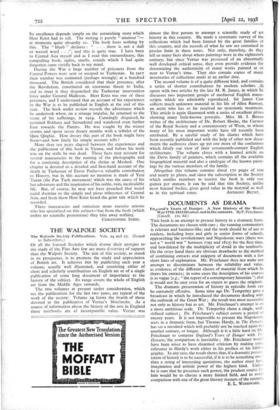DOCUMENTS AS DRAMA
England's Years of Danger. A New History of the World War 1792-1815 Dramat_sed in Documents. By P. Frischauer. (Cassell. 12s. 6d.)
THIS book is an attempt to present history in a dramatic form. The documents are chosen with care ; the running commentary is relevant and business-like, and the work should be of use to readers, including boys and girls in senior forms of schools, approaching the revolutionary and Napoleonic wars (there was not a " world war " between 1792 and 1815) for the first-time, and bewildered by the multiplicity of detail in the textbooks. On the other hand there are obvious drawbacks to the method of combining extracts and snippets of documents with a few short lines of explanation. Mr. Frischauer does not make any attempt to discriminate between the reliability and value, as evidence, of the different classes of material from which he draws his extracts; in some cases the description of his sources is so vague (e.g., "the report of a contemporary historian ") that it would not be easy even for an expert to guess the originals.
The dramatic presentation of history in episodic form can be extremely effective. Some time ago Dr. Temperley gave a broadcast in which he introduced the documents dealing with the outbreak of the Great War ; the result was most successful not only as history but as art. Mr. Frischauer's attempt is on a more ambitious scale. - Dr. Temperley chose a single, well- defined subject ; Dr. Frischauer's subject covers a period of twenty years. It is not impossible to present the Napoleonic wars in a dramatic form, but Thomas Hardy, in The Dynasts, has set a standard which will probably not be reached again for another century, or longer. Although it is a little hard on Mr. Frischauer to compare England's Years of Danger with T/r Dynasts,'the comparison is inevitable ; Mr. Frischauer would have been wiser to have disarmed criticism by making some reference to Hardy's work either in his preface or his biblio- graphy. In any case, the result shows that, if a dramatic presen- tation of history is to be successful, if it is to be something morn than a string of interesting quotations, the author must have imagination and artistic power of the highest kind. Unless, he is sure that he possesses such power, the prudent course for him would be to choose a more limited field, and to avoid comparison with one of the great literary masters of the century. E. L. WOODWARD.










































 Previous page
Previous page